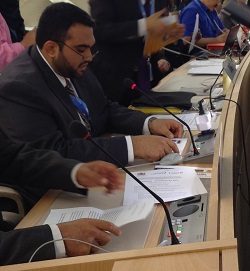On 18 June, Americans for Democracy and Human Rights in Bahrain (ADHRB) Husain Abdulla delivered an oral intervention at the 26th Session of the United Nations Human Rights Council in Geneva under Item 9 regarding racism, racial discrimination, xenophobia and related forms of intolerance. Please continue reading for full remarks or click here to download a PDF.
Please click here for a translation of this document in Arabic
###
Mr. President,
Alsalam Foundation, together with Americans for Democracy & Human Rights in Bahrain (ADHRB) and the Bahrain Institute for Rights and Democracy (BIRD), would like bring to the Council’s attention certain cases of religious intolerance and discrimination in the Kingdom of Bahrain, specifically: the continued targeting of Shi’a places of worship; exclusionary labor practices against Shi’a—particularly regarding the security forces; the dissolution of the Shi’a Islamic Scholars Council; and the harassment of leading Shi’a religious figures in the country.
As documented by the Bahrain Independent Commission of Inquiry, 53 Shi’a religious structures were destroyed in 2011. While only 10 mosques have been rebuilt in the 3 and a half years since, six of these mosques were rebuilt by local Shi’a communities at their own expense. Furthermore, some rebuilt and repaired mosques have suffered further subsequent damage by authorities.
Bahrain continues to target many leading Shi’a spiritual leaders with harassment and detention, including: Sheikh Mohammed Habib Muqdad, Sheikh Mirza al-Marhoos, Sheikh Abduljalil Muqdad, Sheikh Mohammed Ali al-Mahfood, and Sheikh Abdulhadi al-Mokhodir. Particularly concerning to the Office of the High Commissioner is the case of Sheikh Hussain Najati, whose Bahraini citizenship was arbitrarily revoked in 2012. Continued abuses against him were recently reported by the UN Special Rapporteur on freedom of religion or belief, Mr. Heiner Bielefeldt, who expressed his concern that: “on 23 April [2014] [Sheikh] Hussain Mirza Abdelbaqi Najati was forced to leave his own country for Lebanon after being exposed to enormous pressure and harassment by the authorities.”
The Bahrain government has repeatedly and consistently demonstrated a pattern of religious intolerance and discrimination towards the Shi’a majority population in Bahrain. To address these issues, we call for a country visit by the Special Rapporteur on religious freedom at the earliest possible date. We further call on the Bahrain government to fulfill its commitments to the recommendations of the BICI and UPR reports regarding safeguards against discrimination for followers of all faiths.





